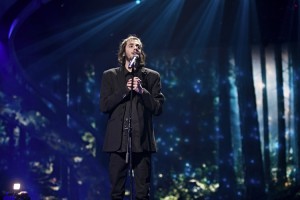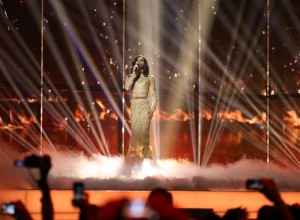Portugal Takes Eurovision 2017
May 16, 2017
On Saturday, May 13, Portugal’s Salvador Sobral won the Eurovision Song Contest with the song, “Amar Pelos Dois” (Love for Both of Us). The Portuguese-language ballad was written by Sobral’s sister, Luisa. Sobral is the first Portuguese artist to win the the hugely popular European contest. Held every year since 1956, Eurovision is the world’s largest and longest-running annual television song competition. This year’s contest took place at the International Exhibition Centre in Kiev, Ukraine. Each year’s winning nation hosts the following year’s contest. In 2016, Ukrainian singer Jamala won Eurovision with her song, “1944.”

Portuguese artist Salvador Sobral performs the Eurovision-winning ballad, “Amar Pelos Dois,” at the Internatinal Exhibition Centre in Kiev, Ukraine, on May 13, 2017. Credit: © Review News/Shutterstock
Long before “American Idol,” “The Voice,” “The X Factor,” or even “Star Search,” there was Eurovision. The show began as the “Eurovision Grand Prix” in 1956 and became the “Eurovision Song Contest” in 1968. Each year, primarily European countries submit one entry—one artist with one new and original song—to the Eurovision contest. Despite the great variety of nations participating, most songs are in English. The songs are each performed live—often with elaborate stage shows—and votes from the television audience are combined with those of a professional international jury to gradually narrow the competition to the “Grand Final” round. The final songs are then performed and voting determines the overall winner, who performs again and receives the “glass microphone” trophy. This year’s competition began with 42 national entries; 26 took part in the Grand Final.

Conchita Wurst, representing Austria, won the Eurovision Song Contest in 2014 in Copenhagen, Denmark. The televised annual singing competition began in 1956 and is the largest music competition in the world. Credit: © AP Photo
More than 50 nations have participated in Eurovision. All active members of the European Broadcasting Union (EBU) can take part in the contest. The EBU is a professional association of national broadcasters that negotiates and advocates on behalf of public broadcasters in Europe. The EBU also includes numerous non-European nations. It operates the Eurovision network, the world’s largest provider of international sports and news broadcasts.
Swedish group ABBA’s superstardom began with the 1974 Eurovision contest, and the show kick-started the career of French-Canadian star Céline Dion (singing for Switzerland) in 1988. Other Eurovision winners have included French singer France Gall (1965) and the British group Katrina and the Waves (1987). In 1958, Italy’s Domenico Modugno placed third at Eurovision with his song, “Nel Blu Di Pinto Di Blu,” better known as “Volare” (made famous by American singer Dean Martin). In 1994, Eurovision first presented the Irish dance production Riverdance to international audiences. Ireland has won Eurovision seven times, more than any other country.


